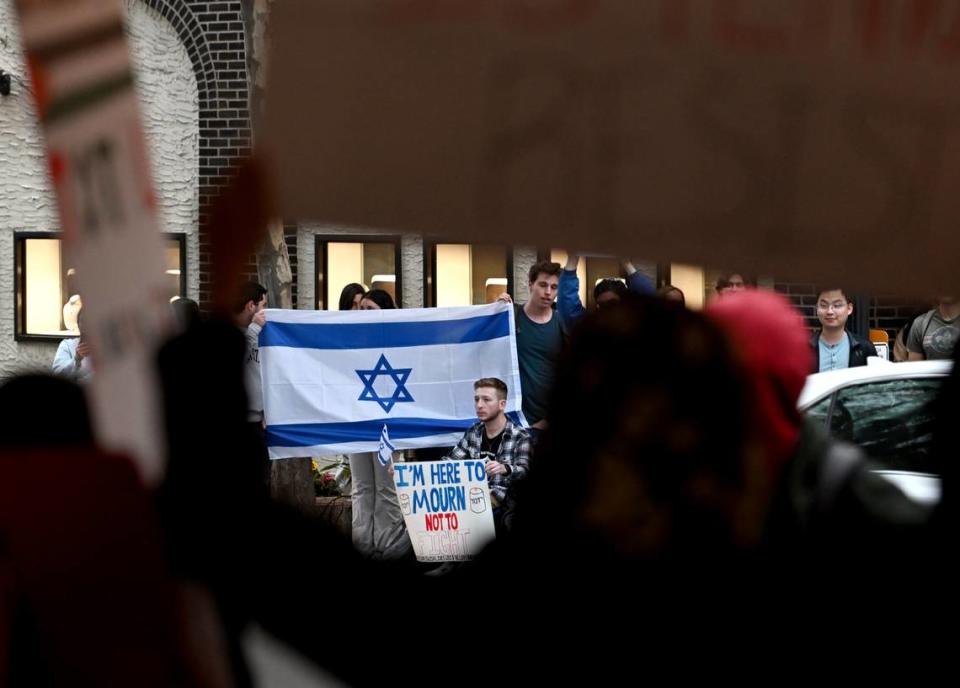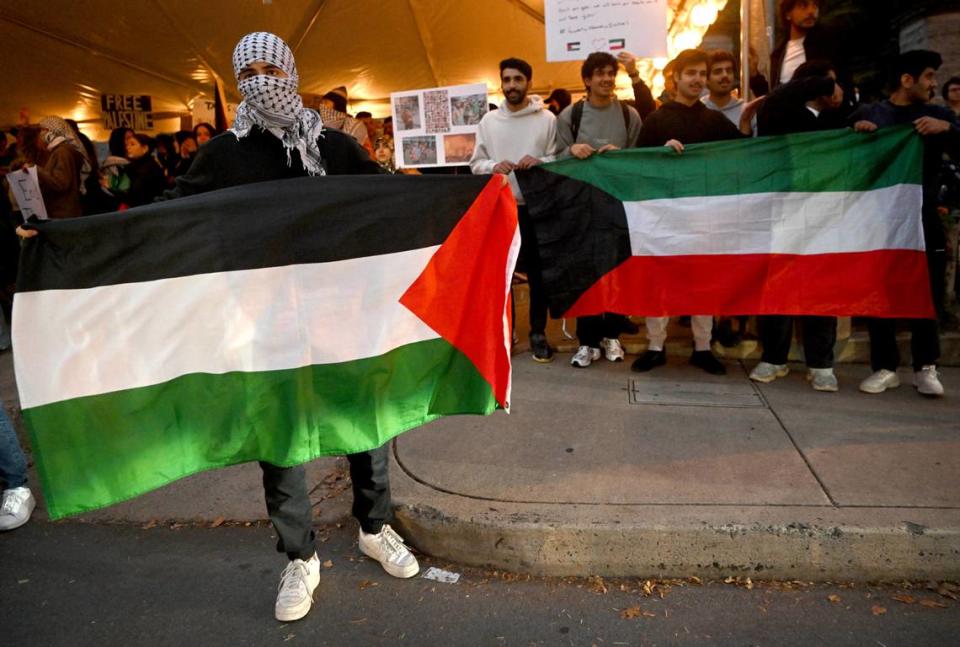Open letters circulating at Penn State address Palestine solidarity, speech on campus
With the Israel-Hamas war causing tension on college campuses across the United States, two open letters have circulated at Penn State that emphasize supporting Palestinian people is not inherently antisemitic or anti-Jewish — though one letter argued some speech has already crossed that line.
At its heart, both letters written by Penn State faculty members shared the same sentiment: Criticizing Israel, or supporting the human rights of Palestinians, is just as acceptable as supporting Israel and its people. But the second letter took exception with several examples included in the first, intimating that some behavior has crossed the line into supporting antisemitism or even supporting Hamas, a militant organization that the U.S. and other Western countries designate as a terrorist group.
Alex Lubin, a Penn State professor of African American Studies, helped organize and write the first open letter, which has 224 signatures and counting. He didn’t want to serve as a referee for every questionable exchange — “Smart people can disagree about these things,” he said — especially when there seemed to be little disagreement about the main point of his letter.
“It’s a letter calling on our community to fulfill the promise of a university as a place where we can have difficult conversations without personal reprisals, dehumanization or censorship,” Lubin told the CDT. “And it’s also a place where we can hold two things at once — that is vulnerability and mourning comes with many people in our community, and siding with one side doesn’t mean we should dehumanize or ignore the other.”

National incidents impacting locals
Nationally, both Jews and Muslims have been impacted by significantly increased hate.
The Council on American-Islamic Relations said, in the 29-day window after Hamas attacked Israel on Oct. 7, it received 1,283 requests for help — a 216% increase compared to the average 29-day period last year. The Anti-Defamation League, an international Jewish organization, said it recorded 312 antisemitic incidents in the U.S. within two weeks of the attack — a 388% increase over the same period in 2022.
There are plenty of examples to pull from. A 6-year-old Palestinian-American boy was killed near Chicago last month after a landlord stabbed him 26 times, reportedly over anger for “what was going on in the Middle East.” In California earlier this month, a 69-year-old Jewish man died following a physical altercation with protesters supporting Palestinians.
Nothing resembling the severity of those incidents has occurred in Centre County, although some recent acts — such as antisemitic messages in plastic bags being delivered to State College homes — show this community is not immune to hate. Still, Lubin said students confided in him that they were worried — and their concerns sparked his desire to create this letter with four other colleagues.
“We, the undersigned Penn State faculty and community members, affirm the right of members of our community to support Palestinian human rights, to articulate their desires for a free Palestine, and to express criticism of Israeli state violence and occupation,” the letter began. “We also affirm the right of members of our community to criticize Zionism without being accused of antisemitism. We condemn antisemitism in all forms.”
Paul Medvedev, a professor of computer science and engineering, and biochemistry and molecular biology, helped organize the second letter that boasts 139 signatures. It started, “We want to affirm our support for the right of members of our community to support Palestinian human rights as well as their right to express criticism of Israel.” Unlike the first letter, however, it drew key distinctions between supporting Palestinian human rights and “supporting terrorism.”

Where’s the line with antisemitism, Islamaphobia?
Medvedev’s letter pointed to two specific examples in the first, when it came to crossing the line from supporting Palestinians to supporting antisemitism.
Lubin’s letter railed against how some university students and professors across the country “have been doxed, fired and otherwise harassed and victimized,” with three examples linked within the text. One redirected to a New York Times story about an NYU law student whose job offer was pulled after criticizing Israel.
Medvedev’s letter pointed out the student publicly blamed Israel for the attack on itself — and Medvedev believed that crossed the line. “Israel bears full responsibility for this tremendous loss of life,” the student wrote.
Lubin responded: “First of all, I don’t agree with that (NYU student’s) statement because I think there’s more context needed. Secondly, I think that there are many examples from which we could have chosen, some of which may have been better to link, of people who have had jobs taken away more because of their political statements.”
Medvedev also cited a “Day of Resistance” protest at the Allen Street Gates, organized by Students for Justice in Palestine (SJP) and other community groups, that his letter-signers believed veered over into antisemitism. The letter specifically referred to “militant images.”
SJP’s national organization has been accused of supporting Hamas and had distributed two protest fliers, one of which included a graphic of a paraglider, one way in which Hamas attacked Israel on Oct. 7. The CDT did not spot any local usage of that specific flier, and local organizers appeared to try distancing themselves from the controversy by declining to discuss SJP or Hamas.
Still, there is gray area between what crosses the proverbial line. At protests, including those in State College, supporters of Palestine have shouted, “From the river to the sea/Palestine will be free.” Many Palestinian activists say it’s a call for equality and peace, while others believe the mantra is calling for the elimination of Israel, since it’s also located between the Jordan River and Mediterranean Sea. Hamas also claimed the slogan in 2012.
Speaking for himself and not other letter-signers, Lubin acknowledged the phrase doesn’t seem particularly “strategic” for anyone to use. “When either side talks about eliminating the other side, that’s wrong,” added Lubin, who is Jewish and taught in Beirut, Lebanon, for three years.
Finding common ground
Some 117 faculty members and 107 others signed Lubin’s letter, compared to 48 faculty members and 91 others with Medvedev’s letter. Lubin’s was titled, “Open Letter to the Penn State Community Regarding Palestine Solidarity,” while Medvedev’s was, “Open Letter to the Penn State Community Regarding Speech on Campus.”
Both intimated that supporting Palestinians was different from supporting Hamas, and no one should feel uncomfortable for supporting Palestine or Israel. (However, Medvedev’s letter did believe blame was “disproportionately” placed on Israel.) If a protest does lean in to antisemitism or Islamaphobia, Lubin told the CDT it should be the role of a university to educate the community when that happens.
Both letters cited the words of Penn State President Neeli Bendapudi, who released two open letters three days apart last month. Although the two faculty members quoted different parts of Bendapudi’s letters, the university president was consistent in her message.
“As an educated community that works to create not only an inclusive society, but also a greater understanding of our complex world,” she wrote, “we urge Penn Staters from all backgrounds to come together to discuss our shared humanity, to comfort those in need and to most importantly, hope for peace.”

